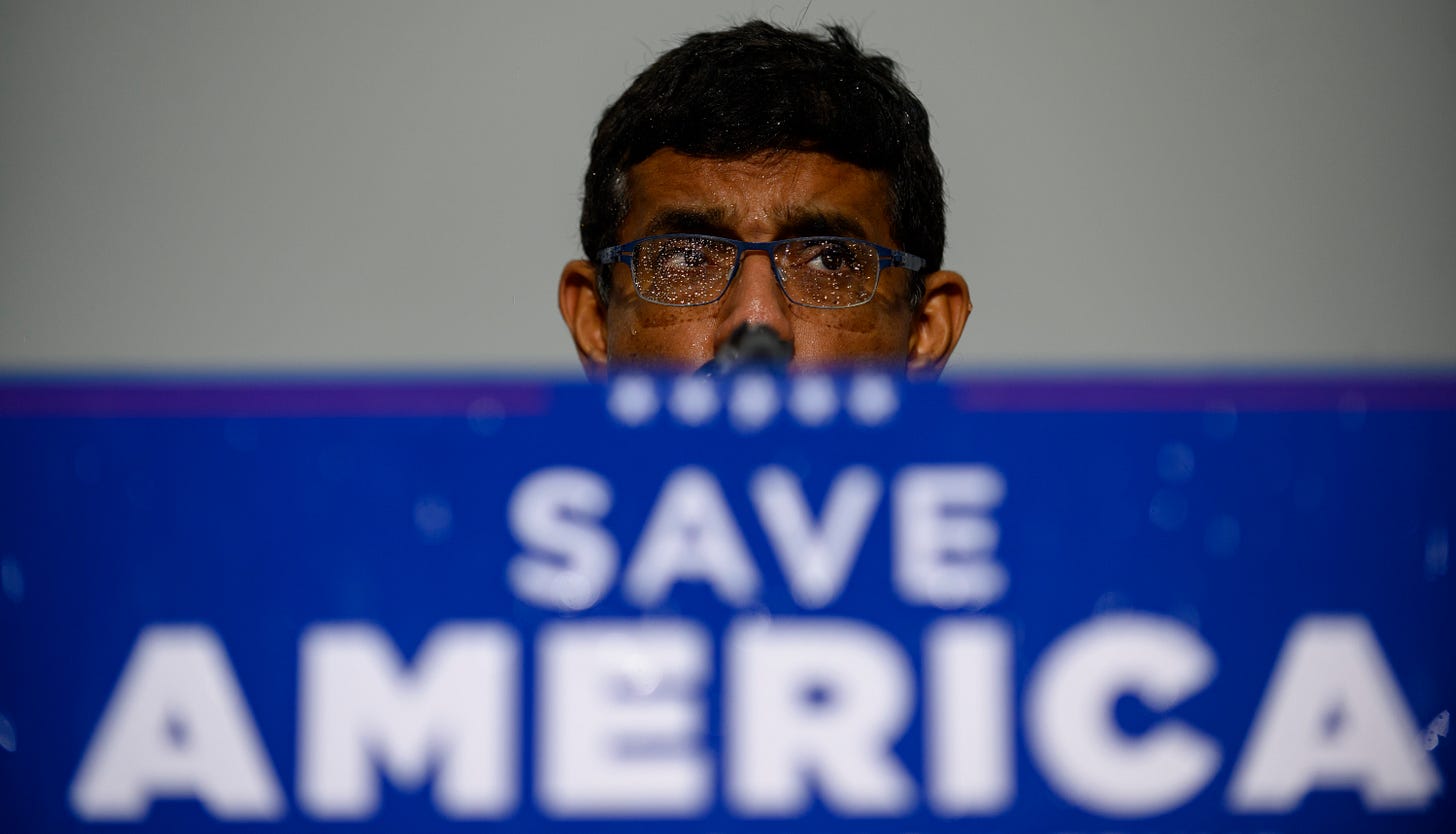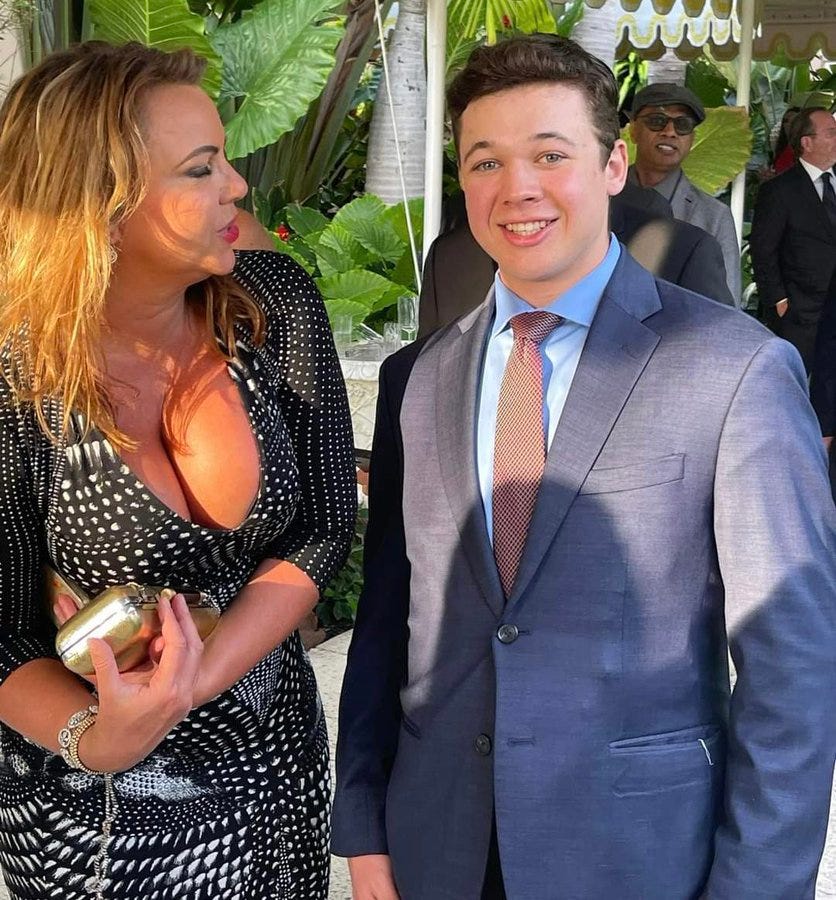Happy Wednesday!
Elon Musk says he will lift the Twitter ban on Trump, which is bad news for the state of our discourse, the cause of Truth, and . . . Donald Trump. As the WSJ editorial board noted:
If Mr. Trump is back in public view, picking fights on an hourly basis and blaming everyone else for his election defeat, he might remind voters why they grew tired of his antics and made him a one-term President.
**
Meanwhile, in D.C., a deeply unsordid act: “House passes $40B military aid package to buttress Ukraine.”
**
Panic in the Pennsylvania GOP: “PA GOP insiders are trying to get their Gov candidates to coalesce around one alternative to Doug Mastriano - pushing everyone else to get out of the race. But it's a longshot and maybe too late.”
**
And, in Nebraska last night, the Trump-backed candidate for governor was defeated . . .
Charles W. Herbster, a Trump-endorsed agribusiness executive who funded his own campaign and, in the race’s final weeks, was accused of groping women…is the first candidate endorsed by Mr. Trump to lose a Republican primary in 2022.
**
But, Trump’s endorsed candidate for Congress in West Virginia won big. My colleague, West Virginia’s own Amanda Carpenter, sends this note to Morning Shots:
The idea that an across-aisle, coalition-building, state-focused pol who delivers infrastructure funds could beat a Trump-endorsed election denier who poured on the MAGA in a GOP primary was thoroughly discredited in West Virginia’s rare incumbent-versus-incumbent primary Tuesday.
Due to population decrease, the Mountain State lost a congressional seat after the 2020 census, forcing Rep. Alex Mooney and Rep. David McKinley to fight each other to represent their new shared district. The two couldn’t have campaigned more differently.
A civil engineer by training, McKinley was in line for a senior position on the Energy and Commerce Committee and campaigned hard to strengthen West Virginia’s bridges, roads, and infrastructure capabilities. In the end, his vote for the infrastructure is what cost him the election. A Trump adviser warned him on the eve of the vote that if McKinley supported President Biden’s bill, Trump would endorse his opponent. McKinley voted yes, Trump endorsed Mooney, and McKinley’s fate was sealed.
Mooney and his allies plastered his image next to Trump’s. Radio spots showcased Trump’s praise for him. They attacked McKinley as a “RINO” for supporting the spending bill and voting for the creation of a bipartisan January 6th commission (although McKinley voted against creating the House Jan. 6th Committee). Trump held a pre-election “tele-rally” on Mooney’s behalf. MAGA was all in; last weekend, Rep. Lauren Boebert traveled to Mooney’s district to stump on his behalf. (Free chance to win a Tavor X95 Rifle Gun giveaway included!)
McKinley tried to build support in other ways. The energy industry backed him. Democratic Sen. Joe Manchin, in an unexpected act, recorded an ad for him. The former Democratic-turned-GOP Governor Jim Justice endorsed McKinley and told voters Trump made “a mistake” backing Mooney. But it wasn’t nearly enough. Mooney won by more than 18 points.
Mooney called his win early. After traveling to Mar-a-Lago last November to secure Trump’s endorsement, Mooney said, “I think this endorsement from President Trump basically makes it impossible for him (McKinley) to win a primary against me.”
One more thing: Although Mooney’s win does confirm the further Trumpification of the GOP after Trump’s disgraceful exit from the White House, it is also evidence of Trump’s shrinking GOP base. Remember, this incumbent-versus-incumbent faceoff only took place because West Virginia lost a House member. Mooney is already a member of Congress; all this really amounts to is one fewer Republican vote in the House of Representatives from West Virginia.
The Big Lie Gets the Big Screen Treatment…
. . . and it’s not going well.
In Dinesh D’Souza’s varied, but consistently deplorable career, he has morphed from author/intellectual-manqué, to convicted felon, to racist/pro-Putin/ Trumpist troll — to his latest role, cinematographer to the gullible.
D’Souza’s new effort, a slickly produced faux-documentary on the 2020 election, 2000 Mules, debuted at Mar-a-Lago with a festive screening attended by many of the notables of MAGA World. Matt Gaetz was there, and of course MTG, as well as conspiracy maven Lara Logan and teen vigilante Kyle Rittenhouse:
It probably will not come as a surprise to learn that the movie itself is a farrago of distortions wrapped in half-baked conspiracy theories and laugh-out-loud falsehoods. Fact-checkers (who are admittedly unlikely to penetrate very far into the MAGAverse’s alternate reality) have been brutal.
CLAIM: At least 2,000 “mules” were paid to illegally collect ballots and deliver them to drop boxes in key swing states ahead of the 2020 presidential election.
THE FACTS: . . . The finding is based on false assumptions about the precision of cellphone tracking data and the reasons that someone might drop off multiple ballots, according to experts. . . .
CLAIM: In Philadelphia alone, True the Vote identified 1,155 “mules” who illegally collected and dropped off ballots for money.
THE FACTS: No, it didn’t.
You get the idea. Here’s one of Georgia’s top political reporters, Stephen Fowler:
I’ve unrolled Fowler’s thread:
-they claim there were more drop boxes in metro Atlanta (309) than actually existed in the *entire* state (just under 300) -the cell phone pings of “antifa rioters” don’t really correspond to real places (like a bunch in a cemetery?)
-the “mule” route doesn’t line up w/dropboxes?
-How come they don’t ever show you videos of the alleged “mules” showing up at multiple locations like they claim to have?
-how come they don’t tell you that even if a ballot is “harvested” the return method is illegal but the ballot (assuming info checks out) is?
-how come they made you pay $30 to consume something that should be so earth-shattering that it should be shared widely for free and it’s a for-profit movie and you can’t see all the evidence they have? -and how come there’s no resolution other than “trust us, it’s bad?”
If anything they claimed was true, many more trusted people and orgs would be sharing it.
It’s not a cover up, it’s a grift, by people who want to scare you into thinking the election was stolen by widespread absentee fraud instead of more people voting for the other candidate!
I’m going back to vacation, but the bottom line is you should trust your vote in Georgia, regardless of party affiliation. It’s the most scrutinized, most accessible most trustworthy system the state has seen. And I hope you still vote!
How awful is 2000 Mules?
It turns out that D’Souza’s batshit crazy conspiracy theory about the election is too crazy even for . . . Tucker Carlson. And Newsmax.
The conservative firebrand took to Twitter on Monday to gripe that sympathetic MAGA media was supposedly suppressing 2000 Mules, his latest propaganda film peddling a wholly flawed and faulty premise about ballot fraud in the 2020 election….
Though the film pulled in over a million dollars this weekend on right-wing YouTube competitor Rumble’s subscription-based platform, D’Souza was salty that Carlson and Newsmax had, according to him, shut down any conversation about his bogus masterpiece.
Don’t you hate it when that happens?
About that abortion vote…
My colleague Sonny Bunch nails this:
I know trying to determine what’s going on with any politician is dicey, but this is a fairly sound point. If (a) most polling shows a vast majority of Americans believe first-trimester abortions should be legal and (b) Schumer’s just working on a stunt vote he knows will fail anyway then (c) why isn’t he pushing a bill just to keep first-trimester abortions legal? I understand worrying about the left flank, but he’s defending his left flank instead of doing something that might conceivably help him maintain his majority.
Quick Hits
1. The End of Abortion Absolutism?
Don’t miss Mona Charen’s thoughtful, nuanced discussion of the possible ways the post-Roe debate over abortion might change.
I believe that the overwhelming majority of abortions can be and should be avoided. Many abortions are sought because women feel under financial strain (which can be alleviated), or because they believe they cannot care for an infant (or another child), which can be addressed by adoption. An unplanned pregnancy need not entail unwanted parenthood. And if, as I believe, terminating a pregnancy is a terrible expedient that should be avoided in all but the most dire situations, then we should be helping women to find alternatives.
With the Supreme Court poised to toss the issue back into politics, we’re going to have to wade into the morally murky realms of unsatisfying compromises and imperfect accommodations of conflicting rights. It’s what we should have been doing all this time instead of indulging the pleasures of purism.
2. The Two-Word Question That Could Decisively Shape Abortion Politics
Must-read by Will Saletan in today’s Bulwark:
State-by-state battles over abortion might go one way or the other, depending on tactics. But the war to shape majority opinion on this issue, if not to set national policy, will likely be decided at the strategic level, by a struggle to define what the debate is about. Is the debate about the decision itself—whether to end a pregnancy? Or is it about who makes that decision?
Those two perspectives have squared off before. In 1989, when the Supreme Court began to roll back Roe, pro-choice strategists framed the issue with a catchy question: “Who decides?” That question dominated the debate for years, and it likely will do so again, thanks to a paradox of public opinion: Most Americans don’t like abortion, but they also don’t like the government telling them what to do.
3. Will the Utah Senate Race Break the Partisan Doom Loop?
Beau Tremitiere in today’s Bulwark:
Imagine, instead, a new minor party that fused with major party candidates based on their commitment to the rule of law and fair elections, and their rejection of political extremism and violence. A Democratic voter leery of the party’s leftward turn on various issues, but nonetheless appalled by the Republican party’s defense of January 6, could support a center-right candidate who rejects the Big Lie without having to vote Republican. And a Republican voter likewise troubled by her party’s extremism could support a center-left candidate without having to vote Democratic. Analysts of fusion voting cite various examples of its salutary effects. But perhaps none is as compelling as the permission-slip it provides to vote across partisan lines without sacrificing one’s partisan identity.








Charlie, I love the Bulwark, or at least I think I do, and it's why it pains me to see articles like the ones you've featured today, because it very much feels to me like either coping or outright delusion on basically everything.
To start with the easy bit, Schumer's bill is merely codifying what is currently already law thanks to Roe v Wade. If that's the 'maximalist' position, then we have a very different idea of what that is. Beyond that, politics is salesmanship, which is why Trump was so bad at it. You don't start with what you want. You put out the position you know you won't get and you let people haggle you down for it to where you actually want to be. That lets them think they got one over on you when you actually got what you want. Beyond that, the reason you need to bring it up for a vote is because you need to A. show the base that you actually do need more democrats in office because you don't have enough to do what they want and B. need to make it clear that the party position on this issue is not up for debate. Parties, at least until recently, stood for things. You couldn't be a communist in Reagan's GOP, and you can't be anti-abortion in today's Democratic party.
Moving beyond that, Mona is well out of her depth about what's coming. The positions are not going to get less maximalist, they're going to get more so, especially on the anti-choice side, which has already begun criminalizing not just abortion but things like Plan B and IVFs. What is coming, simply put, is another version of Dred Scott; we are going to have two Americas, where where you live determines what rights you have. Or we will, until there is a matter like Dred Scott where someone has an abortion in another state and there's a showdown over who has jurisdiction. And if you don't believe me, Louisiana just passed a law wherein it says, explicitly, that any judge that attempts to stop it in the state will be impeached, and any federal law that attempts to overrule it will be ignored. To put it bluntly, the issue of abortion is no less significant than that of slavery in our day and age, and rather than tone down the rhetoric, it's going to go to eleven.
Lastly, a shrinking GOP base means nothing, because they don't believe in elections or in voting. Any Democratic victory is a lie, any GOP failure is only due to evil by the other side. This is what animates the party. It doesn't matter if it's shrinking, because either later this year or in 2024, the party is simply going to seek, as JD Vance says, 'their American Caesar.' American institutions already don't reflect the popular will, and the Supreme Court has now taking to flouting it openly, so if you think it's going to do anything other than rubber stamp the GOP into power you're dreaming.
I hate to say it, but we as a nation are heading either towards a second civil war or dissolution. There is no other way to see the world, given the fact that neither side is going to give up on an issue or a set of beliefs that they consider literally life or death. The right already canonizes figures like Rittenhouse, and we're going to have a whole nation of them before long, I'm afraid.
You might want to tell the anti-choice Mona Charen that the largest number of abortions are performed on women age 15 to 24. Her claim that many women get them because of financial reasons is narrow, simplistic and inaccurate. I wish people like her would stop putting up silly arguments for why we should be second-guessing a right that has been settled law since 1973. Really, handing money to a 15 year old to get her to have a baby?